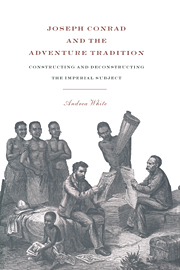Book contents
- Frontmatter
- Contents
- Acknowledgments
- Introduction
- 1 Constructing the imperial subject: nineteenth-century travel writing
- 2 Adventure fiction: a special case
- 3 Them and us: a useful and appealing fiction
- 4 The shift toward subversion: the case of H. Rider Haggard
- 5 Travel writing and adventure fiction as shaping discourses for Conrad
- 6 Almayer's Folly
- 7 An Outcast of the Islands
- 8 The African fictions (I): “An Outpost of Progress”
- 9 The African fictions (II): “Heart of Darkness”
- Coda
- Notes
- Bibliography
- Index
3 - Them and us: a useful and appealing fiction
Published online by Cambridge University Press: 10 December 2009
- Frontmatter
- Contents
- Acknowledgments
- Introduction
- 1 Constructing the imperial subject: nineteenth-century travel writing
- 2 Adventure fiction: a special case
- 3 Them and us: a useful and appealing fiction
- 4 The shift toward subversion: the case of H. Rider Haggard
- 5 Travel writing and adventure fiction as shaping discourses for Conrad
- 6 Almayer's Folly
- 7 An Outcast of the Islands
- 8 The African fictions (I): “An Outpost of Progress”
- 9 The African fictions (II): “Heart of Darkness”
- Coda
- Notes
- Bibliography
- Index
Summary
While adventure fiction was officially validated, given as gifts, sanctioned, advertised, and recommended for its educational and inspiring attributes, and even assigned as required reading, its readership did not have to be sold, such were the immense attractions of this exotic fiction. The appeal it made was both to national, or racial, greatness and to personal fulfilment. Essentially nostalgic, adventure fiction yearned for an imagined golden moment in the nation's past, now endangered or lost completely, and at the same time argued for present outlooks and future courses of action that the fiction itself made especially attractive and justifiable. Thus, as we have seen, the fictions of the 1830s and 40s of Marryat reenacted the English successes against Napoleon's Mediterranean fleet, celebrating the English virtues of manly courage, duty, and continued conquest. In the early decades of the century, then, Marryat sounds the national note that links adventure with imperialism, a relationship that pertains throughout the century though one whose dark diminishment Conrad will record. Kingsley's Westward Ho! celebrated the triumph of Elizabethan England's naval forces over Spain's Armada and justified the parallel of Victorian England's anti-Catholic and expansionist venture in the Crimea. By referring back to the Elizabethan period, the great golden moment for England, he urged his readers to apply the glory of the one to the other. Most readers, apparently, found it agreeable to do so, since sales continued to mount throughout the century.
- Type
- Chapter
- Information
- Joseph Conrad and the Adventure Tradition , pp. 62 - 81Publisher: Cambridge University PressPrint publication year: 1993



